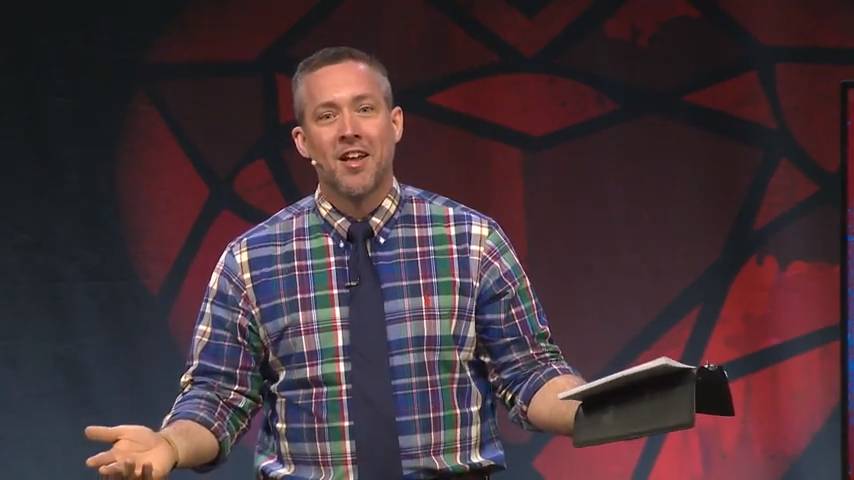 DURHAM, N.C. — J.D. Greear, the president of the Southern Baptist Convention, said in a podcast this week that when communicating with a person who identifies as transgender, he personally would “lean toward” using the individual’s “preferred pronoun” as an act of “hospitality” before the telling them biblical truth.
DURHAM, N.C. — J.D. Greear, the president of the Southern Baptist Convention, said in a podcast this week that when communicating with a person who identifies as transgender, he personally would “lean toward” using the individual’s “preferred pronoun” as an act of “hospitality” before the telling them biblical truth.
“If a transgender person came into our church, came into my life, I think my disposition would be refer to them by their preferred pronoun,” he said during his Monday episode of “Ask Me Anything.” “When we want to talk about gender, I would be clear with them on the truth.”
Greear, pastor of The Summit Church in Durham, North Carolina and author of books such as “Gaining by Losing: Why the Future Belongs to Churches That Send,” noted that Christians have different views on the subject, as some believe one should always speak truth and others feel they should have “generosity of spirit.”
He said that it is a matter of exactly where the “battlefront” is drawn and that it may be a Romans 14 issue about conscience.
“When missionaries have been going into tribes where there are polygamists, what do they do when a chief has 10 wives? Do you take the first one and call her wife and refuse to call anybody else wife because a man can only be married to one wife?” Greear asked. “Somebody that has been divorced — unlawfully divorced in our culture [as per the Bible] … do you insist on calling the former woman his wife and the [new] woman the adulteress?”
“I don’t think there’s evidence for doing that. I think there’s a generosity of spirit that you can communicate there. I’ve heard it called pronoun hospitality,” he said. “That’s the way that I would lean in this.”
Greear cited the writings of Andrew Walker, author of “God and the Transgender Debate,” as well as Preston Sprinkle of The Center for Faith, Sexuality, and Gender, during his discussion. Walker believes that it is acceptable to use a person’s preferred pronoun, but says that the best way to handle the situation is to solely refer to the person by their name.
“My own position is that if a transgender person comes to your church, it is fine to refer to them by their preferred pronoun,” Walker wrote in his book, as cited on the episode web page. “If and when this person desires greater involvement or membership in the church, a church leader will need to meet with them and talk about how they identify.”
“The best solution is to avoid pronouns altogether if possible. Calling a person by their legal name or preferred name is more acceptable because names are not objectively gendered, but change from culture to culture.”
Greear agreed that simply referring to the person’s chosen name is “the most practical way” of handling the situation, in that it avoids affirmation while also showing respect.
He also quoted from Sprinkle in his outline on the episode web page, as Sprinkle wrote in a June 2018 opinion paper, “I believe that all Christians can and should use pronouns that reflect the expressed gender identities of transgender people, regardless of our views about gender identity ethics. If a person identifies herself to you as ‘she,’ I hope you will consider it an act of Christ-like love to call her ‘she’ out of respect, whether or not you believe that the way she expresses her gender identity is honoring to God.”
“I think Christians ought to be charitable in how they approach this,” Greear stated. “I don’t think there’s a definitive right and wrong answer.”
The pastor and author does believe that gender is determined by genetics, not feelings, and that there is only male and female.
Listen to the podcast and read Greear’s notes in full here.
As previously reported, concerns were generated among some in February as a video was circulated online showing Greear singing Whitney Houston’s “I Wanna Dance With Somebody” during a youth event.
“I wanna dance with somebody. I wanna feel the heat with somebody,” he sang and danced after being introduced as “Pastor J.D. Greear, a.k.a. Whitney Houston.” Greear was joined on stage by two others who likewise belted out the tune as they danced together. The audience laughed and cheered.
“You don’t win people to Christ by being like the world. People are won to Christ by sharing the gospel. Being unlike Christ confuses people who don’t know Him,” one commenter said of the recording. “I’ve heard many pastors say, ‘the evangelistic methodology you win them with is a methodology a church will have to maintain to keep them.’”
Become a Christian News Network Supporter...


